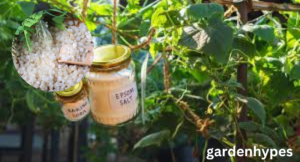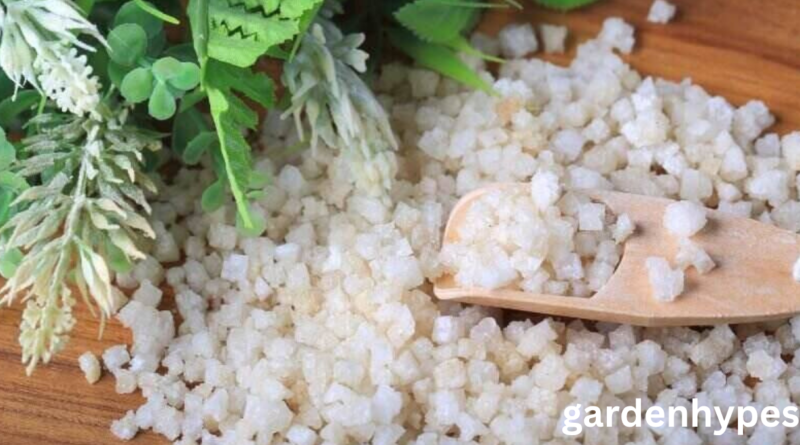Does Epsom Salt Kill Weeds? The Truth You Need to Know
If you’ve ever gone down the rabbit hole of natural gardening hacks, chances are you’ve stumbled upon the idea that Epsom salt can kill weeds. It sounds almost too good to be true—an affordable, non-toxic household item that can clear your garden of pesky invaders? But here’s the thing: not every gardening tip floating around the internet holds water. So, before you pour Epsom salt all over your lawn, let’s dive deep and figure out once and for all—does Epsom salt kill weeds, or is it just another gardening myth?
click in link Japanese Knotweed Berries
Introduction to Epsom Salt and Gardening
What is Epsom Salt?
Despite what the name suggests, Epsom salt isn’t the kind of salt you sprinkle on fries. It’s a naturally occurring mineral compound made up of magnesium and sulfate. Named after a saline spring in Epsom, England, this crystal-like substance has long been used for everything from soothing sore muscles to revitalizing plants.
In the gardening world, Epsom salt is often viewed as a sort of miracle product. It’s praised for its ability to boost plant health, encourage flower blooms, and even improve fruit and vegetable yields. But when it comes to weed control, the claims become a bit fuzzier—and that’s where the controversy starts.
Many people assume that because traditional salt (sodium chloride) can dry out and kill plants, Epsom salt must do the same. But is that really true? Or are we mistaking one salt for another?
Common Uses of Epsom Salt in the Garden
Let’s get this straight: gardeners love Epsom salt. Here’s why:
- Magnesium Boost: Magnesium is essential for photosynthesis. Without it, plants can’t make chlorophyll, the green pigment that captures sunlight.
- Nutrient Absorption: Magnesium also helps plants absorb phosphorus and nitrogen, two key nutrients in fertilizer.
- Stronger Roots & Stems: It’s believed to promote stronger cell walls, helping plants stand tall and strong.
- More Flowers: Some gardeners claim Epsom salt increases flowering in roses, tomatoes, and peppers.
Because of these benefits, Epsom salt is often sprinkled into soil, mixed into water for foliar sprays, or added to compost piles. But again, these are applications meant to help plants, not destroy them.
So, where did the weed-killing idea come from? Let’s find out.
Understanding Weeds and Their Growth Cycle
Why Weeds Thrive in Your Garden
Weeds are like that one neighbor who keeps showing up uninvited. You didn’t ask for them, but they’re everywhere—in the cracks of your driveway, between your flowers, and especially in your veggie patch.
But why do they grow so easily?
- Resilient Nature: Weeds are often “pioneer plants,” meaning they thrive in disturbed soils. They’re built to grow quickly and adapt.
- Fast Reproduction: Some weeds drop thousands of seeds per plant, which can survive in soil for years.
- Minimal Requirements: They don’t need rich soil, frequent watering, or even a lot of sunlight.
- Lack of Competition: When a garden is undernourished or empty, weeds swoop in to take over.
In short, weeds are survival machines. That’s what makes them hard to control—and why so many gardeners are desperate to try anything to get rid of them.
Challenges in Controlling Weeds Organically
Let’s be honest: most commercial weed killers are loaded with chemicals. Sure, they work, but they can also harm the environment, your pets, and even your own health.
That’s why natural or organic weed-killing solutions are so appealing. But the reality is, going organic often means more trial and error. Vinegar, boiling water, cornmeal, newspaper layers—gardening forums are full of creative suggestions, but not all of them actually work.
The idea of using Epsom salt for weed control sits somewhere in that gray area between hope and hype. It’s natural, inexpensive, and already sitting in many kitchen cabinets. But is it really effective—or are we just wasting time and money?
The Popular Claim: Epsom Salt as a Weed Killer
How the Myth Started
It’s hard to pinpoint exactly when Epsom salt was first promoted as a weed killer, but it likely started with homemade weed killer recipes shared on social media and DIY blogs. Many of these recipes combined Epsom salt with vinegar and dish soap, promising a lethal trio for unwanted weeds.

The idea caught on like wildfire, mostly because it sounded so simple and natural. Who wouldn’t want to get rid of weeds without spraying poison?
But here’s the twist: while these mixtures might show some short-term effects, they’re not necessarily long-term solutions. Plus, it’s not always the Epsom salt doing the heavy lifting—it could be the vinegar or the soap (or just drying out the plant above ground).
click in link Japanese Knotweed Berries
What Supporters Say About Epsom Salt and Weeds
People who swear by Epsom salt as a weed killer usually claim things like:
- “It dries out the weeds overnight.”
- “It’s safer than chemical sprays.”
- “It works best on a sunny day.”
- “It kills the root, not just the leaves.”
Most of these claims are anecdotal, meaning they’re based on personal experiences rather than scientific studies. That doesn’t mean they’re false—but it does mean we need to take them with a grain of salt (pun intended).
What’s even more confusing is that Epsom salt is also widely used to nourish plants. So how can something that helps tomatoes grow also kill dandelions?
Breaking Down the Science
What Epsom Salt is Made Of (Magnesium Sulfate)
Let’s get technical for a moment. Epsom salt is chemically known as magnesium sulfate (MgSO₄). It’s composed of:
- Magnesium (Mg): Vital for chlorophyll production in plants.
- Sulfate (SO₄): Helps with plant metabolism and nutrient absorption.
Unlike table salt (sodium chloride), Epsom salt doesn’t dehydrate plants by pulling moisture from their cells. In fact, in reasonable amounts, it can improve a plant’s health—not destroy it.
That’s where the misunderstanding comes in. People hear “salt” and think of the desiccating effects of traditional salt, but magnesium sulfate doesn’t behave the same way.
Scientific Evidence on Its Effect on Plants and Weeds
So, does the science back up Epsom salt as a weed killer? Short answer: no.
click in link Japanese Knotweed Berries
Here’s what we know:
- No Published Studies Support It: As of now, no peer-reviewed scientific research confirms that Epsom salt alone kills weeds.
- Potential for Soil Damage: Overuse of Epsom salt can cause magnesium buildup in the soil, which can actually harm desirable plants.
- Temporary Results: Some weeds may appear wilted after an Epsom salt treatment, but the roots often survive and regrow.
In fact, many gardening experts and agricultural researchers caution against using Epsom salt as a herbicide, not because it’s harmful, but because it’s ineffective.
Faqs
- Can Epsom salt kill weeds permanently?
No, Epsom salt does not kill weeds permanently. While it may cause some visible wilting or leaf damage when combined with vinegar or dish soap, it doesn’t attack the root system effectively. Most weeds treated with Epsom salt mixtures will regrow over time. - Is Epsom salt safer than chemical herbicides?
In general, Epsom salt is safer for humans and pets than many commercial herbicides. However, using it in large amounts can alter your soil’s nutrient balance, which may negatively affect nearby plants. It’s “safer” in terms of toxicity, but not always safer for your garden’s long-term health. - What’s the difference between Epsom salt and table salt in weed control?
Table salt (sodium chloride) draws moisture from plant cells, which can kill plants quickly—but it also damages the soil and makes it harder to grow anything afterward. Epsom salt (magnesium sulfate) doesn’t dehydrate plants the same way and is more of a nutrient than a toxin, so it’s far less effective at killing weeds. - Does mixing Epsom salt with vinegar make it more effective?
The vinegar in these DIY weed killer recipes is typically doing most of the work. It’s the acetic acid in vinegar that burns the plant’s leaves. Epsom salt may contribute slightly by disrupting the plant’s mineral balance, but it’s not a proven herbicide on its own. - What are better natural alternatives to kill weeds?
Some more effective natural weed-killing methods include boiling water, horticultural vinegar (with higher acetic acid content), mulching, or manually pulling the weeds. Corn gluten meal can also help prevent seeds from germinating. These options offer better long-term results without relying on questionable home remedies.
